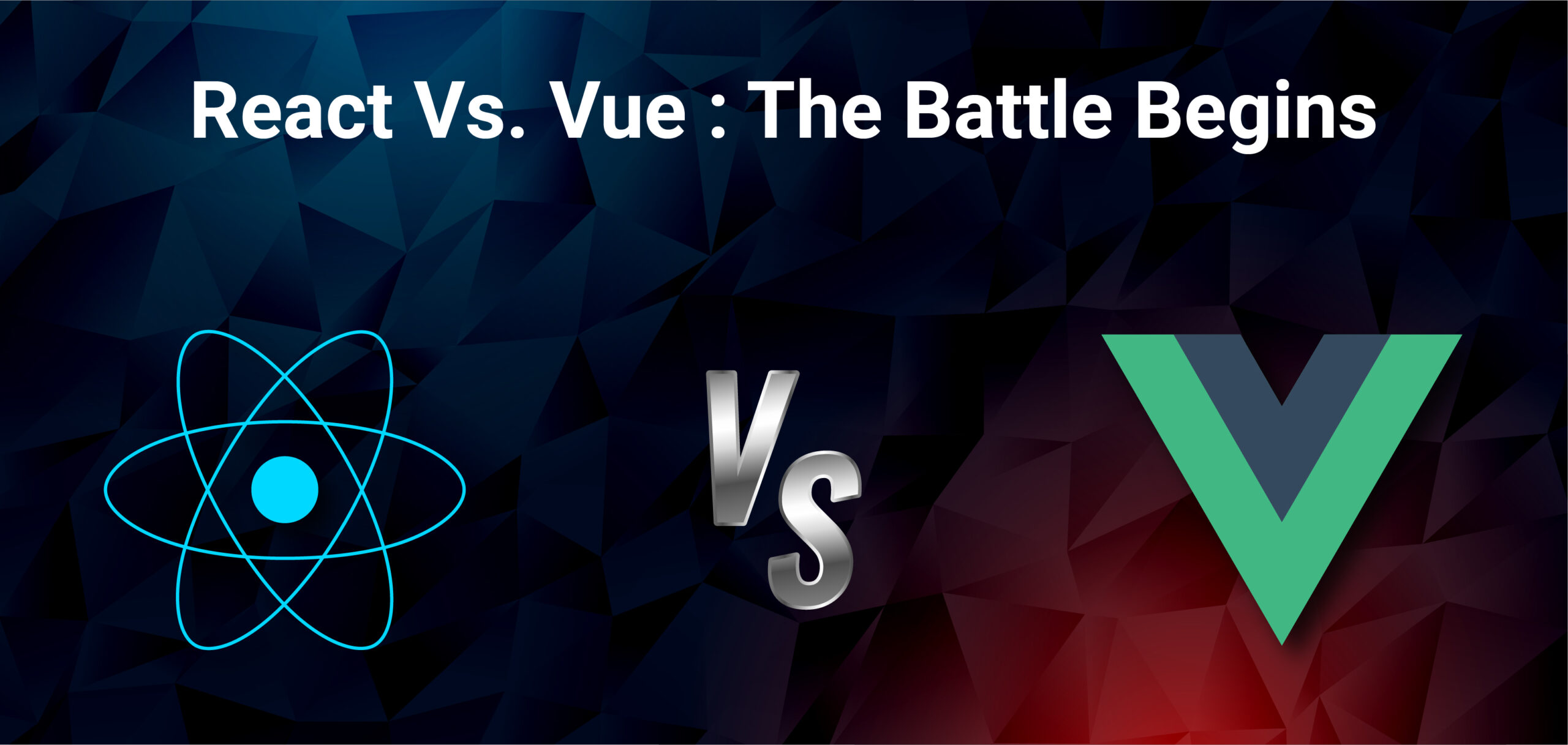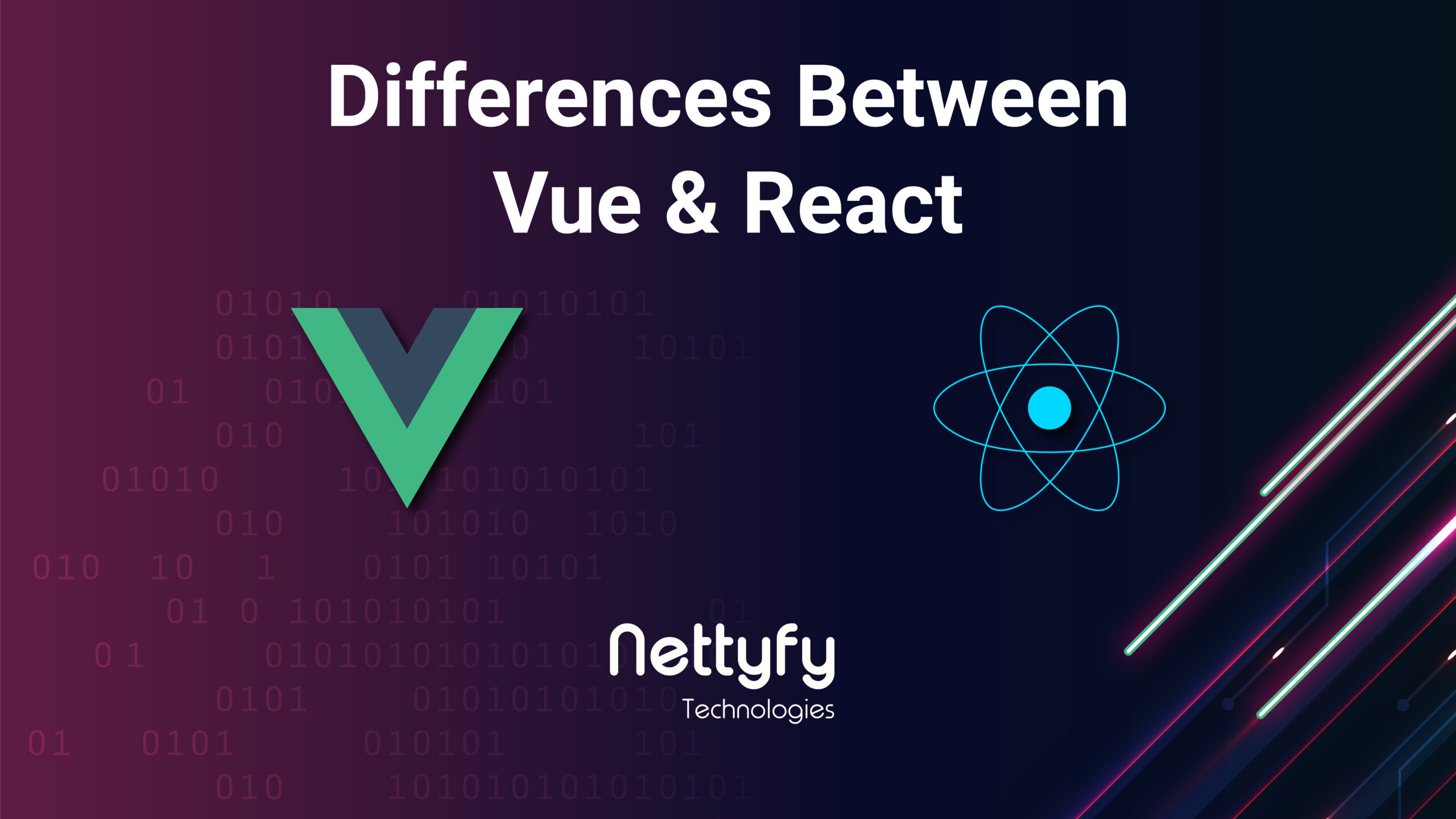Vue vs React – which one to choose in 2021? We know about several frameworks, you know, React, Vue, Angular, but here we talk about Vue and React. What actually are the differences between React and Vue? Often, like we hear a lot from our users and from other people that it’s not clear for them why they should be trying one or the other. And often people will choose one and they will go for it for the rest of their apps. So and you know, when you’re learning a framework, it’s a big decision, right? As the best JavaScript Development Company in USA, we are explaining everything about Vue and React that you want to know.
Before selecting anyframe to work for, we need basic understanding about this.
What Is Vue?
Vue had its first public appearance in 2014 and the very popular JavaScript framework is now used worldwide and among the best options for developing intuitive user interfaces as well as Single Page Applications (SPAs).
Vue is an open-source project, continuously developed further and maintained by its growing community. Vue is ideal for delivering MVPs and startup ideas quickly, thanks to its simple learning curve and tools like Vue CLI 3 and Vue UI. Vue is also a cost-effective solution for small to medium-sized apps as a result of these factors.
What Is React?
React is a JavaScript library that is used in web development for interactive elements on websites and UIs. React can be used for developing efficacious Single-Page Applications (SPAs). React was designed for large-scale Web projects, therefore using it for small and simple apps may be excessive. Although it takes a lot of boilerplate code to get a working project up and running, React’s architecture pays off in the long run.
Vue.js and React have lots of similar features. Although React is a library, it suits building the view of the single-page application the same efficiently as Vue.js.
Common Features In Vue.js And React:
● They enable writing front-end with JavaScript and utilize the virtual DOM for fast data rendering.
● Components have the same single file structure and support JSX.
● Both systems allow uni- and bidirectional data flow for the components.
Vue vs. React: The Battle Begins

Vue vs. React: Performance
● There are concepts like virtual DOM and real DOM. How working with the DOM is organized is a major factor in the performance of JavaScript tools for developing interfaces.
● React uses the virtual DOM, which is a lightweight, browser agnostic system. One of the main reasons for the popularity of React is that it works very efficiently with the DOM.
● Vue also uses the virtual DOM, but compared to React, Vue has better performance and stability.
● According to the data, Vue and React’s performance difference is subtle since it is only a few milliseconds. This proves that Vue and React are very similar in terms of performance.
Vue vs. React: Coding Style
● Borrowing some elements from the functional programming paradigm, ReactJS relies on JavaScript Expressions, popularly known as JSX. In simple terms, JSX is a means of adding HTML code within the JavaScript code.
● Everything within the React environment is treated as a component by the JS framework. Moreover, each component has a component lifecycle of its own. For handling these components, React comes with several lifecycle methods.
● VueJS has a coding style that resembles much to the web development scenario that was prevalent before the advent of React. In the true traditional way of coding web applications, Vue separates CSS, HTML, and JavaScript.
Vue vs React: Flexibility
React’s core provides only basic functionality. With the practical application of this library, its capabilities must be expanded. This provides the developer with a great deal of freedom when it comes to selecting additional tools.
They usually solve the following problems with the assistance of additional libraries:
● routing,
● application state management,
● server rendering, and
● mobile app development
Vue, as opposed to React, provides a more comprehensive set of standard tools to developers. This enables you to use third-party libraries to solve the same problems that the React ecosystem typically solves.
Vue vs React: Community Support
● React is backed by Facebook, the world’s largest social media platform. The most significant benefit of this is that FB has a dedicated team that focuses on developing and improving React on a daily basis. Several internal Facebook products are coded in React.js.
● Owing to the substantial involvement of Facebook in React development as well as implementation and promotion, the JavaScript library has garnered attention from the world over its entire run.
● Unlike ReactJS, VueJS isn’t supported by any big organization. However, that doesn’t mean that it lacks community support or that it is less popular. It’s that the Vue community is not as big as that of React.js.
● Vue came to existence almost 9 months after React was introduced to the world. Moreover, Vue remained popular in its home country i.e. China for its starting years. It gained a loyal global audience some years later. Nonetheless, it is surely headed for greatness.
Vue vs. React: Desktop And Mobile Development
● According to React, everything is simple. With React Native, you can write native iOS and Android apps using the same knowledge.
● Vue is tricky here. Vue officially supports the Weex project, a cross-platform UI framework built by the Alibaba Group. With Weex, you can use the same Vue syntax to create the browser’s components and to iOS and Android at the same time.
● At the moment, Weex is still in the active phase of development and is not yet as mature and tested by experience as React Native.
● Another variant of NativeScript-Vue is a NativeScript plugin for building truly native apps using Vue.js.
Advantages And Disadvantages Of Vue

Advantages Of Vue
● Vue syntax is easy and simple to comprehend.
● The small size of the new runtime library
● The good documentation with additional best practice examples
● Single file components
● Easy to Integrate
● Easy Development
● Versatility and scalability
Disadvantages Of Vue
● More Flexible than Required
● Fewer Components or Plugins
● Small Community
Advantages And Disadvantages Of React

Advantages Of React
● Producing Dynamic Web Apps
● Speed and performance in the application (virtual DOM support);
● Provides opportunities for SEO optimization;
● Server-side rendering;
● Support of Handy Tools
Disadvantages Of React
● Poor Documentation
● Applications are usually heavier;
● Difficult to adapt for all androids.
The Final Call!
The entire process of choosing between Vue vs React for an official project boils down to the particular scenario as well as your business requirements.
Anyone looking to build complex apps with the potential to expand the same in the future with bringing more developers on board, React might be the go-to choice. However, Vue is the best bet when developing a simple and lightweight app.
When choosing between Vue and React for merely learning, you are free to make the pick as both are great options to learn and advance in JS and web development. The aforementioned points will surely help you make your decision.
